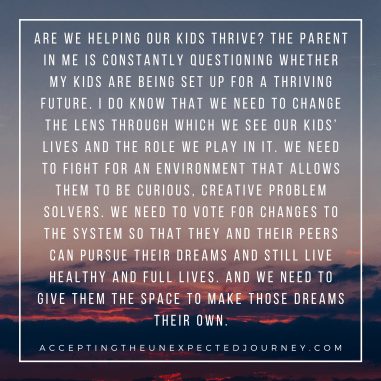Are We Helping Our Kids Thrive?
We should want more for them than an arbitrary definition of success

In Embracing Curiosity, I step away from writing about travel to comment on the bigger journey of life, exploring my faith and politics with curiosity and nuance.
As both a parent and a teacher, it is a question I have frequently asked myself. How many of my students are in survival mode and am I partly to blame for their situation? What am I doing for my own kids to help them discover what it truly means to thrive as a person? What roadblocks am I putting in their way or what am I doing to help them work around the roadblocks that life naturally gives them?
As a country, we seem to have settled into an environment that accepts survival as the social norm. Even before COVID-19 took over our lives, we rewarded excessive work with praise and scolded those who chose leisure. We had created a cult of busyness, always working, rarely playing, and turning even the most leisure activities into competitions with friends and strangers (think reading challenges, exercise streaks, and bucket lists). Not that there is anything wrong with that, but when that is all that we are, when we are so busy and focused on the end result that we are just trying to survive until we cross the finish line, we have lost sight of what it means to thrive. And when we allow the same level of pursuit for our children, what are we teaching them about the importance of thriving over surviving?
I would argue that as a collective whole, we’re not teaching them to thrive at all.
I’ve seen it over the last 19 years as a high school teacher. I’ve watched student anxiety grow over inflated GPAs, dependence on test scores, and over-commitment to activity after activity in an effort to boost college applications. Students trip over each other to compete for spots in “top” universities and experience crushing defeat when they don’t get into the school of their choice, convinced that their future aspirations have been destroyed by having to “settle” for their second or third choice. Instead of focusing on what they have learned and how that learning has enriched their understanding of the world around them, they pursue the opportunities that will get them the best class rank, often taking advanced courses they aren’t interested in or that they struggle with just because a certain grade in those classes will earn them higher points in the GPA scale. And the pressure from home is immense. I recently had a student whose mom threatened to pull him out of the school where I taught because he got a B in my dual credit course. I spent forever trying to reassure him that his success was in that he got such a high B in a college course as a high school junior. He had nothing to be ashamed of, and yet the pressure to be perfect was so high that I’m not certain that assurance set in.
Even with my best students, this has led to cheating, depression, extreme test anxiety, and academic burnout before they actually start college and the realistic pursuit of their dream careers. Activities that they loved at the beginning (athletics, music, art) sometimes lose their allure as they realize that the hours they have put into those pursuits have prevented them from enjoying other parts of childhood: family vacations, summer jobs and the independence that extra spending money could give them, dates, dances, and standard leisure time. Adulthood is knocking on their door and parents and teachers are asking them what they want to do with their futures and they haven’t felt the freedom to just be kids for several years.
Is it any wonder that the last year of isolation and downtime and lack of structure is causing a significant rise in mental health issues for younger Millennials and Generation Y? Thriving, whether emotionally or financially, it quite frankly like chasing a unicorn. They can’t get there because they have never been taught to see thriving as the ultimate goal. Not only that, but Millennials are the first generation in modern American history to be worse off than their parents. They really are just surviving. And Generation Y, as hopeful as they may be, are currently facing a similar future.
The experience of watching my students struggle with the conflict between surviving and thriving influenced how I wanted to parent. It started with decisions that my husband and I had to make early on. We wanted our kids to have the opportunity to be involved in activities that captured their interest but we also didn’t want to be owned by those activities. How young was too young for dance (a short lived venture for our daughter) and sports for both of our kids? Were they really ready for basketball and soccer? Were we really ready for the commitment that those activities would take? What about academic bowls and accelerated learning and afterschool clubs and summer programs? Where would we draw the line and would we know where the line was before we crossed it?
I can’t say we’ve always been successful in managing that balance, but we’ve tried.
Our kids do well in school and we expect them to do their best. While they are still in elementary school, they know that we expect good grades from them because that is what they are capable of, but what they learned is more important that the final percentage they come home with. We allow them to participate in sports and have stretched our limit with our son, who frequently plays two sports at once. But we refuse to be the parents who give up our family vacations and much needed down time so that our children can be involved all the time in activities that are supposed to be learning and growing experiences, not the determining factor in their future.
Thriving is not achieved through the relentless pursuit of success. It is achieved through time and the freedom to explore. It is achieved through emotional and financial security. It is achieved through support and nurture. We know this and yet it is still one of the most difficult parenting pursuits for Americans. Some of us face very real roadblocks which need to be removed by changed policy. Some of us are so focused on our missed opportunities that we struggle to see how our desire to make sure our kids also don’t miss out might be impacting our kids. Some of us just don’t understand the systemic pressures that are weighing down our adolescents because that pressure just wasn’t there when we were kids.

I don’t have the answer. The parent in me is constantly questioning whether my kids are being set up for a thriving future. But I do know that we need to change the lens through which we see our kids’ lives and the role we play in it. We need to fight for an environment that allows them to be curious, creative problem solvers. We need to vote for changes to the system so that they and their peers can pursue their dreams and still live healthy and full lives. And we need to give them the space to make those dreams their own.
Maybe by doing this we can finally break the cycle and raise a generation that sees a thriving nation as the norm and not just a goal.
Please “like” by clicking on the ❤ and share this post with your friends so that others can also join the journey.

